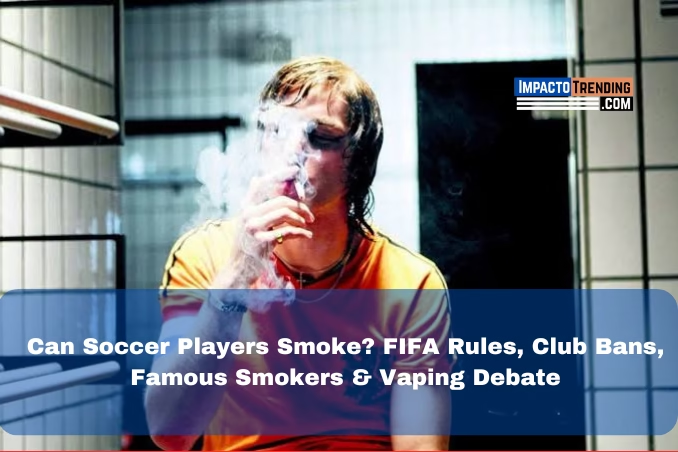Can Soccer Players Smoke? FIFA Rules, Club Policies & Football’s Smoking History
The image of professional footballers undermines their reputation as top athletes and fitness influencers.
Nevertheless, countless football legends and active professionals have been linked to smoking throughout the history of football.
This comprehensive guide explores FIFA smoking regulations, professional club tobacco policies, and the physical and medical implications of smoking for soccer players.
Also, analyse more on the well-known footballers who smoke, and the growing use of vaping among professional football players.
Why Soccer Players Shouldn’t Smoke
Professional football is considered the most exhausting sport, needing outstanding cardio fitness, sprinting power, and efficient respiratory function.
Cigarette smoking leads to major obstacles to maximum football fitness and superior performance, as it greatly damages these essential fitness components.
• Carbon monoxide from cigarettes is compelling the cardiovascular system to increase workload and strain the heart muscle during physical activity, as it reduces oxygen transport through the circulatory system.
• Tobacco tar severely decreases Lung function and weakens respiratory performance in athletes and smokers. It results in lung tissue damage and tissue hardening.
• Nicotine addiction leads to blood vessel tightening, which disrupts muscle recovery time and increases sports injury risk among footballers, and it also decreases circulation.
• Weakened immune function from smoking renders professional footballers likely to develop illnesses, respiratory diseases and regular sickness that can disrupt training schedules.
Professional footballers who rely on intense speed, energetic jumping strength, and sustained high-intensity performance throughout 90-minute matches, encounter serious strategic weaknesses and shortened athletic careers when consuming cigarettes.
FIFA’s Official Smoking Rules
Despite the strict regulations on illicit sports drugs, FIFA does not include a specific rule that prohibits footballers from smoking in their personal time.
During the 2002 FIFA World Cup, extensive no-smoking policies were introduced. It bans smoking in stadiums for everyone, including fans, coaches, and match officials, during games.
By 2010, these anti-smoking regulations were enforced globally, to help create more extensive stadium experiences and enhance better health practices at sports stadiums.
The prominent football manager Maurizio Sarri, widely known for his heavy smoking habits and repetitive smoking behaviour.
He had to comply with Premier League smoking policies and quit his sideline smoking during his service at Chelsea FC because of the strict stadium anti-smoking policies.
Club Policies on Smoking: The Real Enforcers
While FIFA has no universal smoking ban, football clubs enforce strict no-smoking rules.
The majority of player contracts contain clauses discouraging or forbidding smoking to protect performance and the club’s reputation.
• Health and investment – Clubs spend millions on players and expect maximum performance. Smoking reduces physical performance, and recovery time.
• Public image – Footballers are global influencers and clubs are cautious of negative publicity from players caught smoking.
Some clubs sanction players caught smoking publicly, showing how seriously the issue is taken.
Famous Soccer Players Who Smoked
Throughout football history and despite contemporary anti-smoking regulations, several legendary football stars and iconic professional players have been documented smokers with well-known cigarette habits:
• Johan Cruyff – The legendary Dutch football legend continued a serious smoking addiction during his professional playing days and managerial career. Cruyff eventually developed from smoking-related lung cancer and passed away from the disease in 2016.
• Sócrates – The legendary Brazilian midfielder and certified physician continued frequent cigarette consumption during his professional football playing days.
• Modern examples – Recent football stars Marco Verratti, goalkeeper Wojciech Szczęsny, and striker Mario Balotelli were seen in smoking photos by paparazzi and social media, causing a serious negative response and negative sports media coverage.
Such smoking incidents reflect the major change of professional football perspectives, moving from an era when smoking habits were common among players to current expectations where smoking is regarded as a reputational risk and damaging to the sport’s reputation.
Vaping and E-Cigarettes in Football
Increasing use of e-cigarettes and vape products has ignited new debates in professional football.
While presented as less harmful smoking methods, e-cigarettes and vape products retain addictive nicotine that damages cardiovascular performance and heart health in athletes.
Several professional football teams have enforced extensive vaping bans as well as standard smoking bans.
Having interpreted vaping as damaging to athletic fitness levels and risky to career image.
Just like smoking habits public vaping incidents can generate negative media coverage, fan criticism, and serious damage to a footballer’s public reputation and marketability.
Conclusion: Can Footballers Smoke?
Professional footballers are officially allowed to smoke cigarettes under FIFA regulations, with no official smoking ban, while smoking introduces serious career risks in current football.
The combination of major health impacts on physical performance, strict professional club anti-smoking policies, and heavy public pressure from fans and sports media, causes smoking habits a serious disadvantage that can endanger football careers.
Today’s football culture demands total dedication to peak performance, making smoking, once common among legends, a habit that is now incompatible with professional success.

